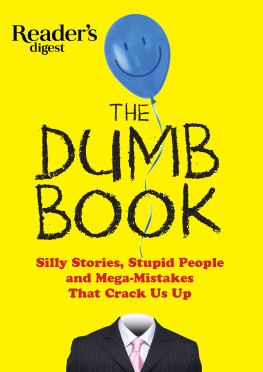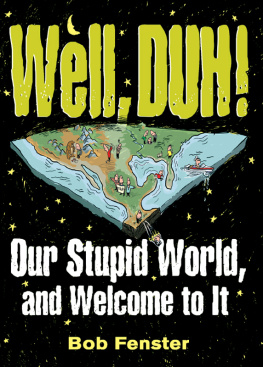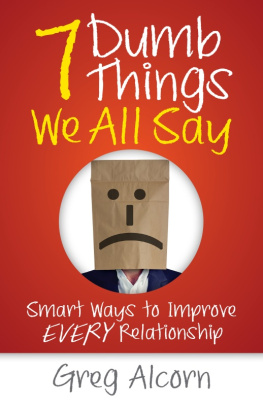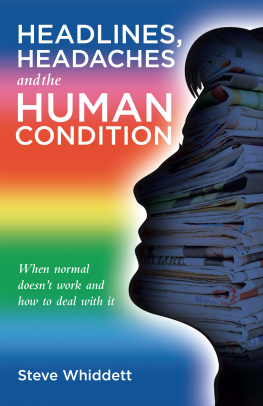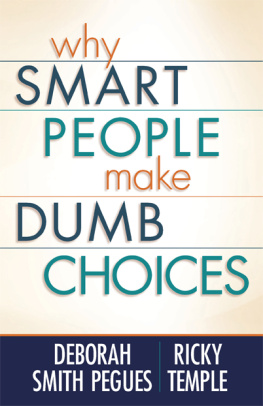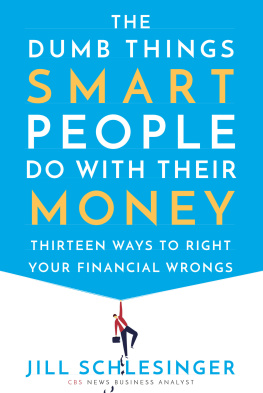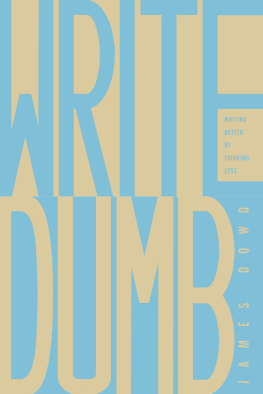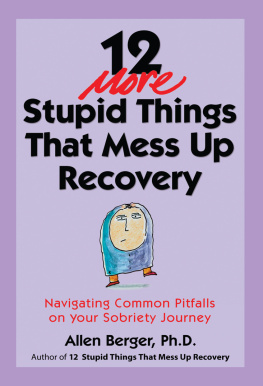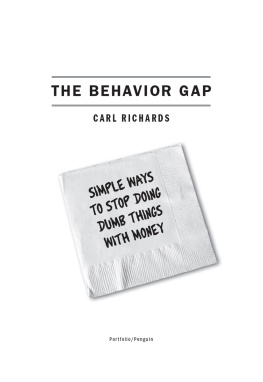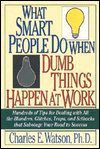None of this would be possible without you.
I am grateful beyond words.
Life is difficult.
M. Scott Peck
Life is tough... but its much tougher if youre stupid.
Chapter 1
The Dreaded Dumb Tax
It is not supposed to be easy.
Anyone who finds it easy is stupid.
Charlie Munger, Vice Chairman o f
Berkshire Hathaway
Smart people do dumb things.
Heres the proof: How much money would you have right now if I gave you the ability to unwind any three financial decisions you have ever made? Write that number down... seriously.
Over the last thirty years of mentoring, coaching, advising, and teaching business owners, I have asked this simple question to tens of thousands of entrepreneurs, business owners, and CEOs. I have yet to have anyone tell me her wealth or income would be unchanged.
Chances are the erroneous assumptions you made that caused these financial mistakes were obvious with the passage of time. The problem is that by the time you woke up and smelled the coffee, the decision had been made and the loss incurred.
We have all paid dumb tax; mine is in the tens of millions.
I am a smart man, but not as smart as I think I am. I am an expert at business and investing, yet I have been bankrupt. The intergalactically dumb decisions and assumptions that caused this financial disaster were not a result of an inadequate IQ but rather an unwillingness to use it. Thinking is critical to sustainable success in business; said another way, business is an intellectual sport.
The bulk of my problems are a result of indigestion and greed, not starvation. Had I been more thoughtful (and less emotionally impulsive) in the initial decision-making process, I would have made far fewer bad choices and, as a result, my wealth would be many multiples of what it is today... and so would yours.
Years ago, after suffering a humiliatingly large dumb tax, it dawned on me that I have a seemingly unlimited ability to hit unforced errors and sabotage my business and financial success.
Here is my startling, yet obvious conclusion and the premise for this book: It turns out that the key to getting rich (and staying that way) is to avoid doing stupid things. I dont need to do more smart things. I just need to do fewer dumb things. I need to avoid making emotional decisions and swinging at bad pitches. I need to think!
Here it is on a bumper sticker: All my problems started out as a good idea and all those good ideas were emotionally justifiable at the time. Not only that, my current financial condition represents my very best thinking. Yours does too.
I have yet to wake up in the morning and say to myself, Okay, Keith, today is the day you are going to permanently screw up the rest of your life. Today you will do some things that will have major catastrophic consequences for decades to come. Today is the day you will not use your best ideas or even your second-best ideas. Today is the day you will only use your third-best ideas! When you stop to think about it, what sabotages our dreams and causes most of our problems (and ensuing dumb tax) is our excessive optimism and emotional belief in magic pills, secret formulas, and financial tooth fairies. (All balloons look good when they are filled with hot air.) Dumb!
We make it harder than it needs to be. We gravitate toward impulsive, glandular decisions instead of thoughtful, rational ones.
As John Maynard Keyes astutely said, Most people, when confronted with a choice of changing their thoughts or proving there is no need to change, get busy on the proof.
Here it is on a bumper sticker: Emotions and intellect work inversely. When emotions go up, intellect goes down. Optimism is a deadly emotion in the business world. Warren Buffett said it best: Optimism is the enemy of the rational investor.
In other words, I need fewer good ideas. Well... that s not exactly true. I need fewer good ideas that I jump out of my chair and execute without weighing the alternatives and thinking about what could go wrong (the 2nd-, 3rd-, and 4th-order consequences) and whether or not those consequences are acceptable.
More often than not, critically thinking about what could go wrong and doing the work to mitigate those risks before taking action is abandoned in favor of comfort zones, the path of least resistance, and speed (instant gratification).
Most of us have heard of, own, and in some cases actually read a book that was first published almost eighty years ago. With more than 70 million copies sold since its original publication in 1937, this international best seller is considered to be the bible for business success. The name of Napoleon Hills book is Think and Grow Rich . It isnt Use Your Gut and Grow Rich or Sit in a Dark Room, Om, and Visualize a Sack Full of Money Dropping on Your Head and Grow Rich or Do What You Love and Grow Rich. Its not about touching yourself, closing your eyes, or relying on fantasy economics (which are only effective in fantasies). And its certainly not a Secret. Its THINK! (There are no secrets... just stuff you havent learned yet.)
My outcome for this book is that it will add to your tool belt, knowledge, and insights to support you in being thoughtful about your decisions and decision-making process prior to taking action. You will run your business more effectively, make more money, and dramatically increase the likelihood of keeping that money if you adopt the discipline of Thinking Time.
Chapter 2
The Discipline of Thinking Time
I insist on a lot of time being spent thinking, almost every day, to just sit and think. That is very uncommon in American business. I read and think. So I do more reading and thinking, and make less impulse decisions than most people in business. I do it because I like this kind of life.
Warren Buffett
The idea of writing a book about Thinking Time (which I am hoping was not my 3rd-best idea) has been in the making for decades. It started over twenty-five years ago (shortly after I paid a gigantic dumb tax), when I began tracking and recording the critical skills, tools, and insights I learned the hard way and which I have found are necessary to be sustainably successful. In the process, I have developed several core beliefs that have molded my thinking, actions, and results. Here are the critical few that are relevant for this book:
- There is no such thing as a natural business owner. Successful business owners and entrepreneurs are not born with an innate set of skills that produce business excellence and success. Great business owners work hard, practice, study, test, think, correct, and practice some more. None are infallible or perfect, but all are committed to excellence and mastery of the game.
- Attempting to win the game of business by trial and error is about the stupidest way to learn anything. Trial and error is a Pin the Tail on the Donkey strategy that is painful, slow, and expensive, and it rarely succeeds. If I wanted to call you on the phone, I could Google your number, or I could start randomly dialing numbers in the hope I would one day stumble onto the right combination. By then, of course, I would have forgotten what I wanted to talk to you about.


